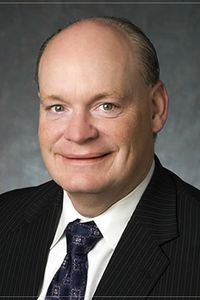Help us improve in just 2 minutes—share your thoughts in our reader survey.
Keynen Wall
Keynen Wall (also known as K. J.) is a judge of the Kansas Supreme Court. He assumed office on August 3, 2020. His current term ends on January 8, 2029.
Wall ran for re-election for judge of the Kansas Supreme Court. He won in the retention election on November 8, 2022.
He was appointed by Gov. Laura Kelly (D) on March 11, 2020, to fill the vacancy left by Justice Lawton Nuss.[1] To learn more abnout this appointment, click here.
The Kansas Supreme Court is the court of last resort in Kansas. The Supreme Court has jurisdiction to review the decisions reached by lower courts within the state. To read more about the court, click here.
Biography
Wall received a B.S. in communication from Kansas State University in 1993 and an M.A. in scientific and technical communications from the University of Minnesota in 1996. He graduated from the University of Kansas School of Law with a J.D. in 2001.[2]
He was a judicial clerk for John Lungstrum on the United States District Court for the District of Kansas from 2002 to 2004. He then worked as an associate attorney for Witwer Oldenburg Barry & Johnson in Colorado from 2004 to 2008. From 2008 to 2013, he was senior legal counsel at Federated Insurance in Minnesota.[2]
Wall worked at the Kansas Supreme Court as special projects counsel and deputy general counsel from 2013 to 2015. He then returned to private practice as a partner at the Forbes Law Group from 2015 to 2020.[2]
Elections
2022
See also: Kansas Supreme Court elections, 2022
Kansas Supreme Court, Kenyen Wall's seat
Keynen Wall was retained to the Kansas Supreme Court on November 8, 2022 with 64.7% of the vote.
Retention Vote |
% |
Votes |
|||
| ✔ | Yes |
64.7
|
567,079 | ||
No |
35.3
|
308,976 | |||
Total Votes |
876,055 | ||||
|
|
Campaign themes
2022
Ballotpedia survey responses
See also: Ballotpedia's Candidate Connection
Keynen Wall did not complete Ballotpedia's 2022 Candidate Connection survey.
Appointments
2020
Wall was appointed to the Kansas Supreme Court on March 11, 2020, by Gov. Laura Kelly (D). He was appointed to fill the vacancy created by Justice Lawton Nuss' retirement.[1]
State supreme court judicial selection in Kansas
- See also: Judicial selection in Kansas
The seven justices on the Kansas Supreme Court are selected through the assisted appointment method. The Kansas Supreme Court Nominating Commission is responsible for providing the names of nominees to the governor, who must then select a justice from that list.[3] The commission is made up of nine members, one lawyer and non-lawyer from each congressional district and one additional lawyer who serves as chairperson. The four non-lawyers are appointed by the governor. Four lawyers are elected by members of the Kansas State Bar in each congressional district. The fifth lawyer is elected by a statewide vote of members of the Kansas State Bar.[3]
Newly appointed justices serve for at least one year, after which they must stand for retention in the next even-year general election. If retained, the justice serves a six-year term and must stand for retention every six years after that point to remain in office.[3]
Qualifications
To serve on this court, a judge must:[3]
- have at least 10 years of active and continuous law practice in the state;[4]
- be at least 30 years old; and
- be no older than 75. If a sitting judge turns 75 while on the bench, he or she may serve out the term.
Chief justice
The court's chief justice is chosen by seniority. He or she is the longest-serving justice on the court and serves as chief indefinitely.[5] Upon his or her retirement, the justice with the next-longest tenure on the court becomes chief justice.
Vacancies
If a midterm vacancy occurs on the court, the seat is filled as it normally would be if the vacancy occurred at the end of a judge's term. A judicial nominating commission recommends qualified candidates to the governor and the governor selects a successor from that list. The new appointee serves for at least one year and then stands for retention.[6]
The map below highlights how vacancies are filled in state supreme courts across the country.
See also
2022 Elections
External links
Footnotes
- ↑ 1.0 1.1 Kansas, Office of the Governor, "Governor appoints Kenyen J. (K.J.) Wall to fill vacancy on the Kansas Supreme Court," March 11, 2020
- ↑ 2.0 2.1 2.2 Kansas Judicial Branch, "Justice Keynen 'KJ' Wall Jr.," accessed June 28, 2021
- ↑ 3.0 3.1 3.2 3.3 Supreme Court Nominating Commission, "Filling a Supreme Court vacancy," Aug. 6, 2020
- ↑ This may include work as a lawyer, judge, or full-time teacher at an accredited law school.
- ↑ Our Kansas Courts, "Judicial Selection," accessed Sept. 24, 2021
- ↑ Kansas Judicial Branch, "Kansas Supreme Court," accessed June 21, 2021
| ||||||||||





